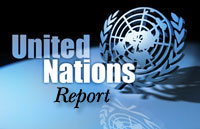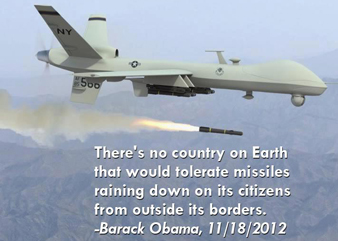Drones, peacekeeping controversial mix for United Nations
By Saeed Shabazz -Staff Writer- | Last updated: Feb 5, 2013 - 10:10:13 AMWhat's your opinion on this article?

|
While the talk in UN corridors Jan. 21 centered on the rather basic tone of the speeches, the Russian and Cuban ambassadors hit home with calls for dealing with the “root causes of conflict” and the protection of civilians.
“Civilian protection could not be used under any pretext to promote regime change or military intervention,” stated Cuban Ambassador Rodolfo Reyes Rodriguez.
Ambassador Vitaly Churkin of the Russian Federation expressed concern with arbitrary interpretations of international law for civilian protection. “It is unacceptable, for example, to use that to achieve political goals, especially as a pretext to interfere with the internal affairs of sovereign states,” said Ambassador Churkin.
The irony again United Nations Peacekeeping arguments that civilians would be better protected in conflict areas through use of drones.
Zimbabwean Deputy Ambassador Sophia Nyamudiza, speaking to The Final Call after the Security Council meeting, said her delegation opposed the use of drones by the Department of United Nations Peacekeeping because there is the “possibility” such spying would be used against regimes in Africa not favored by Western powers.
“No, to drones,” said Namibian Deputy Ambassador Jerobeam Shaanika. “We don’t want robots in Africa,” he told The Final Call.
But Ambassador Youssoufou Bamba of Cote d’Ivoire, and the representative for the 15-nation Economic Community of West African States, told The Final Call drones are necessary as assets to “root out the insurgents.”

Image: VeteransNewsNow.com
|
On Jan. 8, behind the closed doors of the UN Security Council chambers in the basement of the Secretariat building on East 42nd St., debate over the use of drones by Department of United Nations Peacekeeping began in earnest. However, after the meeting the head of peacekeeping refused to comment to the press.
According to UN blog Inner City Press, the spokesman for UN Secretary-General Ban Ki-Moon would only say “UN peacekeeping assets and resources are used in line with Security Council mandates, force requirements and guidelines.”
Medea Benjamin, spokesperson for CODEPINK, called the use of drones by the UN “a slippery slope.” She said the discussion concerning drones must be conducted in an open and clear manner.
“Ok, to use surveillance drones in the DRC (Democratic Republic of the Congo), but there is still not enough information on what the real purpose may be for using these drones,” Ms. Benjamin said. “We must understand the parameters.”
The UN has very good reasons for not sharing information on drone use, according to Dr. Walter Dorn, professor of Defense Studies at the Canadian Forces College. “An attacker could use the information against DPKO (peacekeeping forces),” Dr. Dorn told The Final Call.
The professor, who is considered an expert on peacekeeping and the use of drones, said Department of United Nations Peacekeeping already has the authority to use drones under special conditions. Dr. Dorn revealed that in 2006 the UN authorized the nation of Belgium to use drones during the presidential election in the Democratic Republic of the Congo.
“In 2009, the DPKO put out a request for proposals to member states for drones to be used in the DRC. At that time $90 million was put aside for five years for drones,” Dr. Dorn said.
“The premise, the reason, they want to use drones in the DRC is for cross-border surveillance, and that is bogus,” argued Kambale Musavuli, spokesman for the Washington, D.C.-based Friends of the Congo.
Recent studies by Columbia University and Stanford University point to conclusive proof of the psychological damage to populations in the Middle East where drones are being deployed, he said.
“They are using drones in Somalia; and we believe Central Africa is next,” Mr. Musavuli noted. “We are concerned that there won’t be any oversight,” he added.
“When will there be a mandate to solve Africa’s problems politically—not militarily?” Mr. Musavuli asked.
Related news:
Families of US victims of drone attacks sue top officials (FCN, 07-30-2012)
INSIDE STORIES AND REVIEWS
-
-
About Harriett ... and the Negro Hollywood Road Show
By Rabiah Muhammad, Guest Columnist » Full Story -
Skepticism greets Jay-Z, NFL talk of inspiring change
By Bryan 18X Crawford and Richard B. Muhammad The Final Call Newspaper @TheFinalCall » Full Story -
The painful problem of Black girls and suicide
By Charlene Muhammad -National Correspondent- » Full Story -
Exploitation of Innocence - Report: Perceptions, policies hurting Black girls
By Charlene Muhammad -National Correspondent- » Full Story -
Big Ballin: Big ideas fuel a father’s Big Baller Brand and brash business sense
By Bryan Crawford -Contributing Writer- » Full Story






 Click Here Stay Connected!
Click Here Stay Connected!








